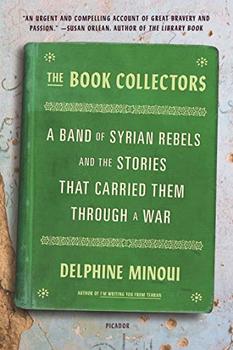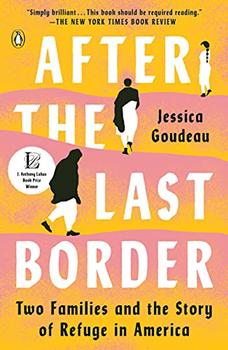Summary | Excerpt | Reviews | Beyond the book | Read-Alikes | Genres & Themes | Author Bio

A Band of Syrian Rebels and the Stories That Carried Them Through a War
by Delphine MinouiAward-winning journalist Delphine Minoui recounts the true story of a band of young rebels, a besieged Syrian town, and an underground library built from the rubble of war.
Reading is an act of resistance.
Daraya is a town outside Damascus, the very spot where the Syrian Civil War began. Long a site of peaceful resistance to the Assad regimes, Daraya fell under siege in 2012. For four years, no one entered or left, and aid was blocked. Every single day, bombs fell on this place―a place of homes and families, schools and children, now emptied and broken into bits.
And then a group searching for survivors stumbled upon a cache of books in the rubble. In a week, they had six thousand volumes; in a month, fifteen thousand. A sanctuary was born: a library where people could escape the blockade, a paper fortress to protect their humanity.
The library offered a marvelous range of books―from Arabic poetry to American self-help, Shakespearean plays to stories of war in other times and places. The visitors shared photos and tales of their lives before the war, planned how to build a democracy, and tended the roots of their community despite shell-shocked soil.
In the midst of the siege, the journalist Delphine Minoui tracked down one of the library's founders, twenty-three-year-old Ahmad. Over text messages, WhatsApp, and Facebook, Minoui came to know the young men who gathered in the library, exchanged ideas, learned English, and imagined how to shape the future, even as bombs kept falling from above. By telling their stories, Minoui makes a far-off, complicated war immediate and reveals these young men to be everyday heroes as inspiring as the books they read. The Book Collectors is a testament to their bravery and a celebration of the power of words.
The Book Collectors works because of its structure. The writing is poetic, but the chapters are short. In fact, most start and conclude with an abruptness resembling the variable length of WhatsApp video chats. In lesser hands, the book would feel like a series of disjointed journal entries recapping what was said in patchy internet interviews. But Minoui uses the choppy style to mimic the intermittent nature of how she met and came to know the individuals in the book. She then teases out deeper and hidden meanings from many of the seemingly banal conversations...continued
Full Review
 (992 words)
(992 words)
(Reviewed by Ian Muehlenhaus).
In The Book Collectors, a band of Syrian resistance fighters work together to salvage and share books from their bombed-out suburb of Damascus. The book focuses on the protagonists' newfound passion for reading, which helps them cope with the hardships of everyday life during very dark times.
Though it's nice to think that these young revolutionaries decided to create this library due to an untamed passion for knowledge, social scientists have shown that there was probably another, more primal reason behind their actions as well. Libraries, museums, marketplaces and civic structures of all varieties are important vectors in identity creation and community building. They are components of what Michael Billig calls "banal nationalism" &#...

If you liked The Book Collectors, try these:

by Evan Friss
Published 2024
An affectionate and engaging history of the American bookstore and its central place in American cultural life, from department stores to indies, from highbrow dealers trading in first editions to sidewalk vendors, and from chains to special-interest community destinations

by Jessica Goudeau
Published 2021
The story of two refugee families and their hope and resilience as they fight to survive and belong in America.